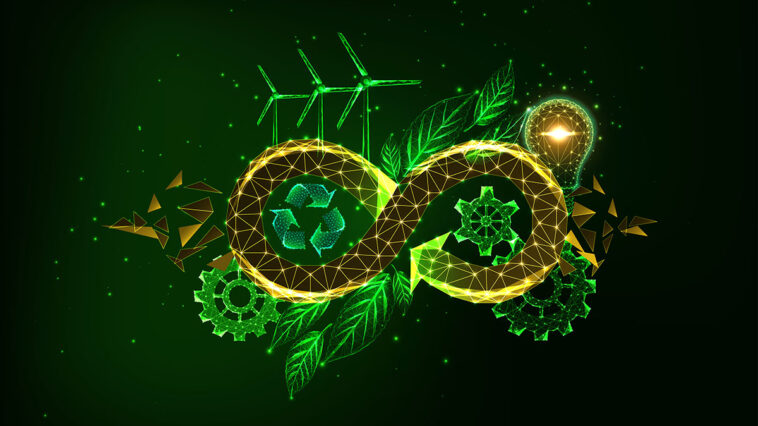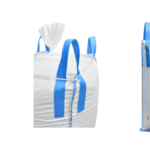With 2024 in the rearview mirror, the world stands at a critical juncture on the path to a sustainable circular economy.
Earth911 has tracked this year’s ups and downs of the movement to reduce waste, maximize resources, and transition to regenerative economic models. Despite the impending environmental policy upheaval following Donald Trump’s re-election, we see signs that sustainable and circular practices are taking hold due to promising innovations. We asked some of our podcast guests for their thoughts and reviewed influential writers to share predictions for 2025.
You can dive deeper into many of these issues through Earth911’s Sustainability in Your Ear podcast for insights from leaders and innovators. And if you want to see how we did this year, look back at our 2023 wrap-up.
Circular Economy in 2024: Where We Stand
The global economy continues to struggle with resource inefficiency. According to reports this year, only 7.2% of materials are cycled back into use, down from previous years. This alarming decline reveals the gap between aspirations and actionable progress.
- Policy and Legislation: Policies like the European Union’s Green Deal and France’s Anti-Waste and Circular Economy Law are expanding repairability mandates and material recovery requirements. Yet, enforcement remains challenging. Listen to Earth911’s episode on circular policy innovations for a detailed exploration.
- Corporate Participation: Major corporations are stepping up. Cisco has committed to designing 100% of its products using circular principles by 2025, while tech giants like Apple and Dell have increased their investment in recycled materials and product take-back programs. Listen to an inspiring discussion about corporate and individual responsibility on the podcast.
- Consumer Awareness: Awareness of circularity is growing among consumers, fueled by transparency initiatives like improved labeling and repairability scorecards. But adoption of these practices is uneven in different regions and industries.
2024 Innovations Driving Circularity
Several industries have made significant advancements this year:
- Fashion’s Breakthroughs: The fashion industry continues to lead with innovations in textile recycling. Companies like Syre are breaking ground on advanced recycling facilities in North Carolina. Explore Earth911’s 2024 podcasts and articles about fashion’s recycling revolution, coming to a store near you in the next several years.
- E-Waste Solutions: Tech companies and startups are ramping up efforts to close the loop on electronics through modular designs and extended producer responsibility. Listen to Sustainability In Your Ear episodes about choosing sustainable electronics and creating an electronics circular economy.
- Packaging: Plastic waste reduction efforts gained momentum in 2024, with bioplastics and refillable systems gaining market share. Learn more about compostable and reusable packaging trends on the Earth911 podcast.
Construction Perspectives
Grant Quasha, CEO of Eco Material Technologies and a guest on Sustainability In Your Ear, suggests that fears of an environmental policy reversal will not likely interrupt the progress of sustainable, low-carbon concrete adoption. In an email to Earth911, he explained that domestic supply chains are greener, more resilient, and, in a tip of the cap to the election results, “put America first.” The rapidly expanding supply of fly ash harvested from abandoned industrial sites by Eco Materials gives concrete producers access to a reliable domestic resource with the added benefit of advancing decarbonization goals.
Sustainability Professionals’ Mood In 2025
Joel Makower, founder of Trellis, known as GreenBiz until earlier this year, took the pulse of sustainability professionals’ outlook going into 2025. While 2024 was a year of challenges and resilience, Makower’s informal survey found that many professionals remain cautiously optimistic despite mounting political pressures. And the evidence suggests there is reason for some sustainability workers to be concerned.
Since the election, several prominent companies have publicly revised or reduced their sustainability goals:
- Unilever: In December, Unilever merged its sustainability and external communications departments, signaling a shift towards a more pragmatic approach to sustainability. The company recalibrated its environmental targets, extending deadlines and reducing the scale of specific goals, such as using virgin plastics and circular packaging. This move has drawn criticism for potentially setting a negative precedent for consumer packaged goods companies, of which Unilever is among the largest and most frequent trendsetters.
- Coca-Cola: Coca-Cola also announced changes to its environmental goals in December, particularly concerning its recycling and reuse targets. The company aims to use 35% to 40% recycled materials in its packaging by 2035, down from its prior goal of 50% by 2030. Additionally, Coca-Cola plans to ensure the collection of 70% to 75% of bottles and cans by 2035, compared to its earlier commitment to recycle one bottle or can for each sold by 2030. Environmental groups have criticized these changes as detrimental and irresponsible.
- Volvo: Even before the election, in September 2024, Volvo revised its “EV or bust” strategy, initially set to achieve a fully electric vehicle lineup by 2030. Citing slow market demand and the need for better industry and governmental support, the company adjusted its goal to aim for 90-100% electrified models by 2030, incorporating both hybrids and battery electric vehicles. Despite this adjustment, Volvo maintains its commitment to sustainability, aiming for carbon neutrality by 2040.
Joel Makower’s survey found that sustainability professionals are preparing for a more challenging year ahead when economic uncertainty and political shifts could test the momentum of sustainability initiatives. Large corporations, Makower wrote, are expected to shift toward pragmatic, scalable solutions and deeper collaboration across sectors, maintaining their efforts while communicating a different message to investors.
What to Expect In 2025
This year promises to deliver opportunities and challenges for the circular economy:
- Scaling Innovations: Many startups piloting circular solutions in 2024 will be scaling up in 2025. Expect more efficient recycling facilities and accessible consumer options, especially in developed markets. We talked with Cemvita cofounder Tara Karimi about converting CO2 into consumer products, EVRNU’s Stacy Flynn about recycling textiles, and Alter Eco Foods CEO Keith Bearden about regenerative chocolate farming, to point out just a few recent interviews. Did we forget to mention kelp-based textiles? Keel Labs founder Tessa Gallagher has made kelp fashionable.
- Circular Design Adoption: Businesses will increasingly adopt circular principles in product development. A recent interview with IKEA’s Mardi Ditize dives into how circular thinking can transform retail. And on another podcast episode, Vivian Tai of GS1 US, which maintains the Universal Product Code, explained the company is working to enable sustainable consumer choices by tracking the entire supply chain in partnership with Wholechain.
- Global Collaboration: With global organizations emphasizing sustainability, 2025 may see new international agreements on waste reduction and resource sharing. Even if the U.S. backs away from aggressive environmental efforts, the rest of the world is going forward. American competitiveness requires green leadership, Clean Power Hour host Tim Montague argued on a recent Earth911 podcast.
- Consumer Engagement: Public interest in sustainable living is expected to rise as governments and NGOs fund education campaigns. Shoppers are willing to pay a 9.7% premium for sustainable products, and 76% of Bain & Company survey respondents said they believe their choices can make a positive difference.
The Road Ahead
While 2024 has seen progress and electoral setbacks, it’s clear that bold actions and systemic change are needed to meet circular economy goals. The coming year will be pivotal in determining how well we can align policies, technologies, and consumer behaviors. For more insights, tune into the conversations on Sustainability in Your Ear.
Changing a civilization that is largely comfortable — for now — was never going to be easy. 2025 will be a pivotal year during which staying the course with our personal environmental commitments is the keystone on which the circular economy can grow. Stay informed and empowered—together, we can close the loop.




GIPHY App Key not set. Please check settings